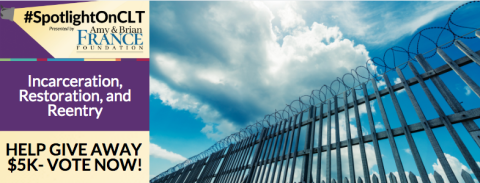#SpotlightOnCLT: Incarceration, Restoration, and Reentry
Over 10,000 returning citizens are released from America’s state and federal prisons every week and land back in their communities often without much support or direction.
Further, approximately two-thirds of the 650,000 ex-offenders who are released from prison every year are likely to be rearrested within three years of release (Department of Justice). Why? Being formerly incarcerated comes with a host of barriers and obstacles as individuals strive to successfully reenter society and start a new chapter even once they have been freed, physically.
In reality, it is no surprise that someone with no job, no money, and no place to live, often finds themselves facing the similar pressures and temptations that likely landed them in prison in the first place. Assisting returning citizens in finding and keeping employment, identifying transitional housing, and receiving mentoring are three key elements of successful reentry into our communities, and Charlotte is no exception. (Department of Justice).
With tens of millions of Americans having some type of criminal record, there is a large population of citizens actively facing barriers finding a place to live, landing a job, reuniting with family, and receiving education (sentencingproject.org).
This month, we are shining our #SpotlightOnCLT on the following local nonprofits who through their core work provide support for individuals who are in incarceration, in the process of restoration, or who are reentering into society. Learn more about how they serve our community and how YOU can support their work, below.
BONUS GOOD: You can VOTE NOW for one of these incredible organizations to take home this month’s Spotlight Series $5K courtesy of the Amy and Brian France Foundation.
- Exodus Foundation.org: exists so that women who have experienced incarceration can lead restored lives marked by healthy decisions, contribution to their communities and self-sufficiency.
-
Center For Community Transitions: provides employment and transition services, they support alternatives to incarceration and restore and strengthen family bonds. They do this through three main programs: LifeWorks!, Families Doing Time, and the Center for Women.
-
Changed Choices: exists so that women who have experienced incarceration can lead restored lives marked by healthy decisions, contribution to their communities and self-sufficiency.
-
Community Culinary School of Charlotte: provides Workforce Development training and job placement assistance in the food service industry for adults who face challenges gaining long-term successful employment, such as formerly incarcerated persons. Their program provides systemic solutions to achieve social and economic objectives - breaking the cycle of hunger and poverty while increasing upward mobility.
-
Brian Hamilton Foundation: provides entrepreneurship for all, their hope is to generally help previously disadvantaged people to take part in the American dream and climb the social and economic ladder. People who have disadvantages might include the formerly incarcerated, minorities, those without a college education, those who have served our country. Through their Inmates to Entrepreneurs program in particular they provide resources to help people with criminal backgrounds start, run, and grow low-capital businesses. The program offers 8-week courses, in-prison classes, and national webinars.
- Beatties Ford Road Vocational Trade Center: provides various construction craft training and fiber optic technician training as well as professional counseling to aid students in psychological health and wellness. Their target population are young men and women that are unemployed, underemployed or re-entering the community from incarceration.
- City Startup Labs: helps close the entrepreneurial divide where under-represented populations of African American millennials, as well as returning citizens (the formerly incarcerated) are not adequately participating in startup activity and business building. City Startup Labs’ ReEntry Entrepreneurship Program (REEP) was created with the notion in mind that entrepreneurship can be a tool for restorative justice.




